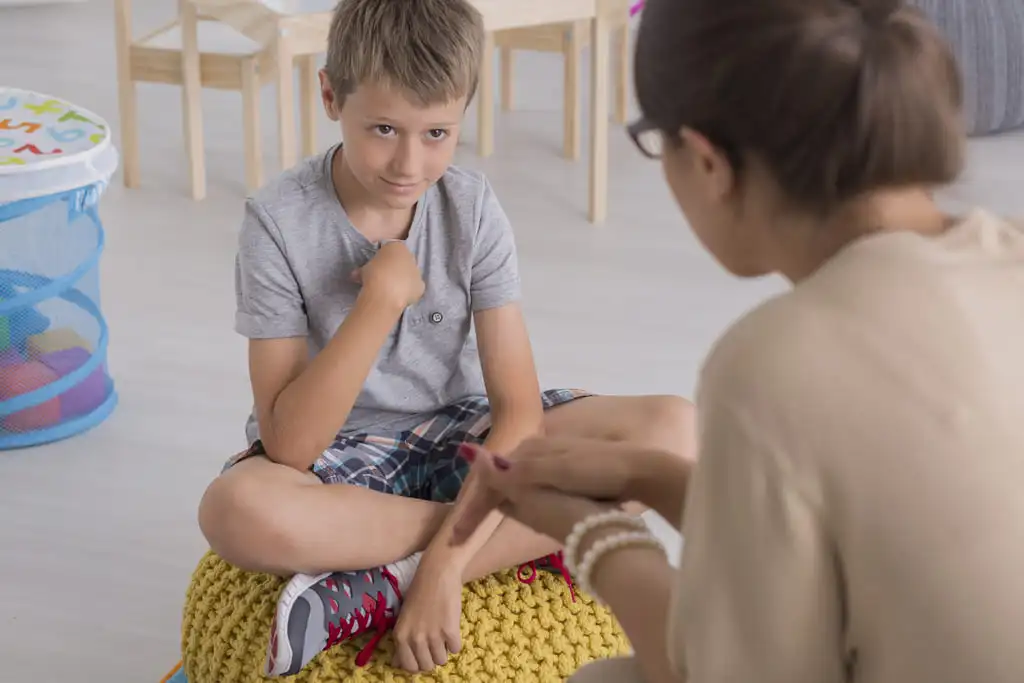Key Takeaways
- Speech therapy helps reduce challenging behaviour by improving communication skills, enabling people to express their needs and feelings, thus reducing frustration and behaviours that challenge.
- Speech therapy techniques to address challenging behaviour include teaching alternative communication methods, such as picture communication systems or augmentative and alternative communication (AAC) devices, and developing strategies to improve social communication skills.
- Family and support workers can support speech therapy goals by reinforcing communication strategies at home, practising therapy exercises with the person, and maintaining open communication with the speech therapist.
- The benefits of speech therapy for people living with behaviour that challenges include improved communication, reduced frustration, enhanced social skills, and better behaviour management.
Factors Contributing to Challenging Behaviour
Challenging behaviours can arise from various factors, and understanding these factors helps specialists to enable adequate intervention and support. One key factor is communication difficulties. People may experience behaviours that challenge when they are unable to communicate their needs, desires, or feelings. This is often true for people living with autism or learning disabilities who may struggle with verbal communication. Additionally, environmental factors play a significant role. Changes in routine, sensory overload, or unmet sensory needs can all contribute to behaviour that challenges. For example, a loud and crowded environment might overwhelm a person with sensory sensitivities, leading to agitation or meltdowns.
Another critical factor is emotional regulation. People may display challenging behaviour when they are unable to manage their emotions. This can be due to factors such as anxiety, depression, frustration, or a lack of coping strategies. Additionally, past experiences and trauma can influence behaviour. People who have experienced trauma may experience challenging behaviour as a coping mechanism or as a response to triggers related to their past experiences. Understanding and addressing these factors through the right support and interventions is key to helping them manage their behaviour and improve their quality of life.
Overview of Speech Therapy

Speech therapy, or speech and language therapy, focuses on providing treatments and support for people experiencing communication, drinking, eating, or swallowing difficulties. Speech and language therapists (SLTs), also known as speech-language pathologists, are trained professionals who provide these services. They work with individuals of all ages, from infants to older people, to improve their quality of life.
Speech therapy is a collaborative journey that includes a wide range of services aimed at improving an individual’s communication and abilities. These can include assessing speech and language skills, developing treatment plans, and providing therapy sessions. Speech therapists work closely with families and caregivers, valuing their input and providing education and support. They use various techniques and tools, such as exercises, games, and communication devices, to help improve communication skills, always with the understanding that teamwork is key to success.
Speech and language therapists work with infants and children experiencing:
Language delay
Speech disorders
Fluency disorders
Voice disorders
Their expertise can help adults experiencing:
Mental health issues
Brain injury
Parkinson’s disease
Stroke
Deafness
In addition to providing direct therapy to support children and adults, a speech and language therapist may work in schools, hospitals, or community health centres to provide language therapy services. They may collaborate with other health professionals, such as occupational therapists and psychologists, to provide a comprehensive language therapy service for people with communication difficulties.
Speech therapy can significantly improve the quality of life for people with speech and language disorders, helping them to communicate more effectively and participate more fully in social, educational, and vocational activities.
Objectives of Speech Therapy
Speech and language therapy aims to address communication and swallowing difficulties in people of all ages. One of the primary objectives is to improve communication skills. This includes developing alternative communication, speech sounds, language comprehension, and expressive language skills. For individuals with speech difficulties such as stuttering or articulation, therapy focuses on improving the clarity and fluency of speech. For people with language difficulties, such as hardships with grammar or vocabulary, therapy aims to enhance their ability to understand and use language effectively.
Another key objective of speech and language therapy is to support people with swallowing disorders, known as dysphagia. Speech therapists work to improve the coordination and strength of the muscles involved in swallowing and address any underlying causes of the swallowing difficulty. This is crucial for ensuring people can safely eat and drink. Additionally, speech and language therapy may also focus on other areas, such as social communication skills, voice disorders, and cognitive-communication disorders.
The objectives of speech and language therapy can be summarised as follows:
- Improve speech sound production
- Enhance language comprehension and expression
- Address fluency and stuttering
- Develop social communication skills
- Improve voice quality and resonance
- Enhance cognitive-communication skills
- Address swallowing difficulties (dysphagia)
Importance of Communication in Behaviour Management

Communication in behaviour management enables people to express their needs, feelings, and thoughts. When communication is clear and understood, people can better convey their needs and desires, reducing the likelihood of frustration and behaviours that concern. For example, if a person within the autism spectrum is feeling overwhelmed, they may not have the words to express this, leading to behaviours like meltdowns. However, if they can communicate their feelings, they may be able to access support or coping strategies to manage their emotions.
Moreover, the right communication can help set clear expectations and boundaries, which are important in managing behaviour. By clearly communicating rules and consequences, people are more likely to understand what is expected of them and the consequences of their actions, which can help reduce challenging behaviour. Additionally, communication can also encourage positive interactions and relationships. When people feel heard and understood, they are more likely to feel valued and respected, which can contribute to a positive environment, enabling improved behaviour.
Communication Difficulties as Contributing Factor to Challenging Behaviour
When people face communication challenges, they may feel a sense of frustration, anxiety, or overwhelm, which can manifest as behaviours that are often perceived as challenging. For instance, a person with limited verbal communication skills might turn to physical aggression or self-injury to express their needs or preferences when they are unable to do so verbally.
Furthermore, communication difficulties can lead to misunderstandings and misinterpretations, which can escalate the situation. For example, a person might experience challenging behaviour because they are unable to comprehend a verbal instruction or because they are attempting to communicate a need that others are failing to understand.
Knowing that challenging behaviour often stems from an underlying need or communication attempt, as health professionals, clinicians, support workers and educators, we have the power to address these communication difficulties. By providing alternative means of communication, such as visual supports, sign language, or augmentative and alternative communication (AAC) devices, we can reduce behaviour that challenges and improve the individual’s quality of life, empowering us with the responsibility to make a positive change.
How Speech Therapy Reduces Challenging Behaviour
Speech therapy can significantly reduce challenging behaviour by managing communication difficulties and improving communication skills. For people living with autism or learning disabilities, speech therapy can help develop alternative means of communication, such as using picture communication systems or augmentative and alternative communication (AAC) devices. By enhancing their ability to express their needs and feelings, speech therapy can reduce frustration and the behaviour that challenges occur as a result of communication difficulties.
Improving Communication Skills
Speech therapy improves communication skills through a structured and individualised approach that targets specific areas of need and different settings when needed. Therapists use a variety of techniques tailored to the individual’s abilities and challenges. For example, for people with limited verbal communication, therapists may introduce alternative communication methods such as sign language or the use of communication devices. They also work on improving speech clarity, language comprehension, and the ability to form sentences.
Therapy sessions often include activities that focus on vocabulary building, grammar, and social communication skills. Therapists also help individuals understand and use nonverbal communication cues such as gestures and facial expressions. By addressing these areas, speech therapy enhances overall communication abilities, enabling them to express themselves more effectively and engage more confidently in social interactions.
Speech Development
Therapists use a variety of techniques to enhance speech production, including articulation exercises, oral motor exercises, and vocalisation practice. Therapists also work on language skills, such as vocabulary building, sentence structure, and understanding and using grammar rules. Additionally, therapists may incorporate play-based activities to make therapy engaging and effective, especially for younger individuals. Speech therapy also focuses on improving overall communication skills, including nonverbal communication, such as gestures and facial expressions.
Non-Verbal Communication
Speech therapy helps people with nonverbal communication by supporting people in developing alternative methods of expressing themselves. In particular, people may learn to use gestures, facial expressions, or body language to convey their thoughts. Speech and language therapists can focus on improving social communication skills, such as turn-taking in conversation and interpreting non-verbal cues from others.

Enhancing Social Interaction
Through speech therapy, people learn how to initiate and maintain conversations, interpret social cues, and understand the nuances of verbal and nonverbal communication. This can help them develop meaningful relationships and participate more fully in social activities. Speech therapy also focuses on pragmatic language skills, which are necessary for navigating social interactions, such as taking turns in conversation, indulging in humour, and expressing empathy. This way, people can feel more confident in social settings and build stronger connections with others.
Preventing Frustration and Anxiety
When people are able to express themselves clearly, they are less likely to experience the frustration of not being understood or not being able to convey important information. This can reduce feelings of anxiety that can arise from communication difficulties. Additionally, speech therapy can help people develop coping strategies for managing communication challenges, which can, in turn, reduce feelings of anxiety and stress.
Empowering Families and Caregivers
A speech and language therapist can provide education and training on supporting the person’s communication development at home. This may include teaching strategies for facilitating speech and language skills, using AAC devices, or implementing communication-friendly environments. By equipping families and caregivers with these skills, the SLT enables them to play a more active role in the individual’s communication journey, leading to more adequate support and improved outcomes.
Speech Therapy with Leaf Complex Care
The speech and language therapists at Leaf Complex Care work closely with people who require complex care to assess their communication needs and develop personalised therapy plans. These plans often include strategies to improve communication skills, such as visual supports or AAC devices.
Our therapy team create plans for reducing behaviours that concern by focusing on producing positive outcomes and improving communication skills through:
- Long-term support
Monitoring and feedback
Watch the inspiring story of Hayden and his continuous progress involving our therapy specialists.
We have ensured that Hayden has a big network of support from our internal team, such as our PBS practitioner and speech and language therapist, to provide a personalised care plan.
– Leaf’s Therapy Team
Get the support you need with our therapy team of specialists in Positive Behaviour Support (PBS), speech and language, and occupational therapy.
You can find us in our Bristol, South East, Birmingham and Somerset offices.

